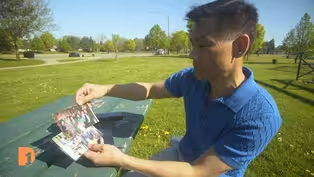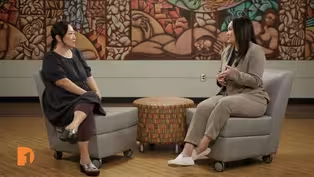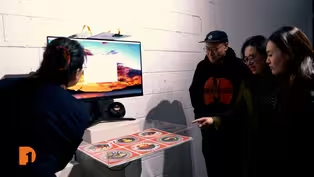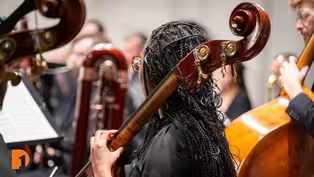
Two Nisei, two histories: Local Japanese Americans reflect on WWII incarceration and its lasting impact
Clip: Season 9 Episode 46 | 6m 40sVideo has Closed Captions
Mary Kamidoi and Shinji Takahashi talk about the Japanese incarceration camps during World War II.
Mary Kamidoi and Shinji Takahashi are both second-generation Japanese Americans but with vastly different childhood experiences. At 11, Kamidoi and her family were forced to a Japanese incarceration camp during World War II. Takahashi, who settled in Ann Arbor in the 1970s, learns about the lasting impact of those incarceration camps from Kamidoi as part of One Detroit’s AAPI Story Series.
Problems playing video? | Closed Captioning Feedback
Problems playing video? | Closed Captioning Feedback
One Detroit is a local public television program presented by Detroit PBS

Two Nisei, two histories: Local Japanese Americans reflect on WWII incarceration and its lasting impact
Clip: Season 9 Episode 46 | 6m 40sVideo has Closed Captions
Mary Kamidoi and Shinji Takahashi are both second-generation Japanese Americans but with vastly different childhood experiences. At 11, Kamidoi and her family were forced to a Japanese incarceration camp during World War II. Takahashi, who settled in Ann Arbor in the 1970s, learns about the lasting impact of those incarceration camps from Kamidoi as part of One Detroit’s AAPI Story Series.
Problems playing video? | Closed Captioning Feedback
How to Watch One Detroit
One Detroit is available to stream on pbs.org and the free PBS App, available on iPhone, Apple TV, Android TV, Android smartphones, Amazon Fire TV, Amazon Fire Tablet, Roku, Samsung Smart TV, and Vizio.
Providing Support for PBS.org
Learn Moreabout PBS online sponsorship(steady music) - Could you describe from the day that you were in your own house in Stockton, California, and now you're in the barracks amongst all these other people, like six to 8,000 people, could you kind of describe how you tried to adjust to that situation?
- Well, you know, when we went in, you were assigned rooms and, you know, and you didn't know the people that were in your block, how they arranged the rooms.
- It says here, 41-9-F. - [Mary] Yeah.
- [Shinji] That was the barrack number.
- And so we really didn't know anybody, all the neighbors alongside, and there's 12 barracks.
All the parents used to tell all the kids, "Be careful who you talk to."
So, you know, they were constantly telling us that because they didn't know who the strangers were.
They thought maybe they might have been working for the government.
- Oh, I see.
- Our parents kept telling us, "Don't talk to strangers.
And if you do, don't say anything about the family."
- Now you're in a situation where your parents are highly suspicious of anything.
- That's right.
Because actually, you know, I lived in 41, and I couldn't tell you that I knew this one and I knew that.
I didn't know a soul in the 12 barracks.
And so, nobody else knew anybody else.
So I think all the parents probably told their kids.
- Do you think the same thing was told to every child at every family?
- I'm sure the parents did.
- Your parents were not unique in that caution?
- I'm sure the parents told their children, "Don't talk to strangers and don't tell 'em anything about the family," because, you know, when they went and took so many people right when the war started, the isseis that were businessmen in town and church leaders and all, they just went in the middle of the night, broke in the houses and just took 'em.
And so because of that, the isseis got a little worried about, maybe the kids will tell them a lot of stories.
And so we didn't really become friendly with a lot of the people in our block.
- You are old enough to realize that, "Hey, I am an American born citizen.
Why is this happening to me?"
Did you ever feel that way?
- Well, yeah, we all felt that way.
But the thing is, you know, you can't fight the government, so.
- Did that feeling of like, you know, this is unfair, did that last a long time?
- It is.
We said that in the camp amongst ourselves, you know, but you know, there was nothing we can do.
So we just sort of let it go.
- How long did it take you to finally say let it go?
I mean.
- Oh, it didn't take me that long because I just figured, hey, what am I gonna do?
I mean, there's nothing I can do about it.
- What about your brothers and sisters?
Did they feel differently?
Did they process it differently?
- No, they didn't because my dad was the kind of person that would have said to us, you know, it's happened, so you're gonna have to live with it.
So don't just keep dwelling on it because you're the one that's paying the price, physically and mentally.
- Have you talked to other people of Japanese descent that were in camp, once leaving camp, how they dealt with this?
I mean, it sounds like you, because your father were able to process it quickly, but.
- The niseis that I met, their parents really didn't talk about it and they didn't pressure the parents for any information about camp life because, you know, we're brought up to obey this and obey that and don't question things.
You know how these days were.
So they never questioned their parents.
And that's why today if you talk to some of these older niseis, they don't know half the story about evacuation.
They said, "How do you know so much?"
And I said, well because, I said, "I ask questions."
You can ask my mother.
She'll tell you, "Of the 10 children I have, you asked enough questions for a hundred people."
- So you're saying that of your nisei generation that were in camp, some of them were too young, some of 'em do have the experience, but they are uncomfortable talking about it?
- That's it.
- And you are very unique because you're very open and you're not uncomfortable talking about it.
So there are many stories out there that have just been left untold.
- That's right.
- So let's get back to the executive order 9066.
Only what you can carry, your family is, at this point unjustly, outta suspicion, put into the camp, you're at Rohwer.
What were your parents' attitude towards that whole action?
- Well, you know, the parents really were afraid, I think, to speak up because they weren't citizens, and they thought first thing they'll do is, they're gonna just pile us on a boat and send us back.
- So they had no idea what would happen the next day.
Even this order comes, they're thinking, "Oh my gosh, oh my gosh, what's gonna happen?"
- That's right.
- And that they may be put on a boat and sent back to Japan?
And they were very fearful of that?
- Well, you know, my dad and mom always talked about that, but, you know, really, the isseis really were not very outspoken in camp.
They were afraid to say anything, and maybe somebody would report them or something.
And so I could understand that.
And they were so ashamed of the fact that they couldn't defend us and keep us outta camp.
- Oh, so they as parents felt shame that they couldn't protect and provide for their children.
- And that's the reason why the isseis never spoke about it, very often, the camp life, even when they got out of camp.
- Because they couldn't function and act as parents.
- They couldn't help us out, and so they blamed themselves.
And so a lot of them nisseis don't know anything about the camp life.
- So you, being old enough as a young teenager and having three years of your teenager life in the camp, could you understand the shame that your parents might have felt by not being able to be a providing parent?
Did you understand that?
- Yes.
I could understand that.
- And you felt that.
- I could understand that, because, you know, you'd see the isseis just walking around, they had nothing else to do walking around, and they weren't speaking to anybody.
And, you know, I really felt sorry for the isseis, more so than, you know, myself or the niseis.
- Because you were old enough to realize that.
Video has Closed Captions
Clip: S9 Ep46 | 3m 29s | Vietnamese Americans living in metro Detroit reflect on the Fall of Saigon 50 years later. (3m 29s)
AAPI Story Series | Brenda Hu and Meaghan Kozar: Am I American Enough?
Video has Closed Captions
Clip: S9 Ep46 | 5m 51s | Two women talk about their Asian American identities and what it means to be “American” enough. (5m 51s)
Interactive exhibition threads together Vietnamese American stories 50 years after Fall of Saigon
Video has Closed Captions
Clip: S9 Ep46 | 3m 30s | Artist Linh My Truong talks about her exhibit “Threads of Passage: From Vietnam to America.” (3m 30s)
One Detroit Weekend | Things to do around Detroit this weekend: May 16, 2025
Video has Closed Captions
Clip: S9 Ep46 | 1m 37s | A spring market, a collectibles fair, a comedy challenge and more events happening this weekend. (1m 37s)
Providing Support for PBS.org
Learn Moreabout PBS online sponsorshipSupport for PBS provided by:
One Detroit is a local public television program presented by Detroit PBS















